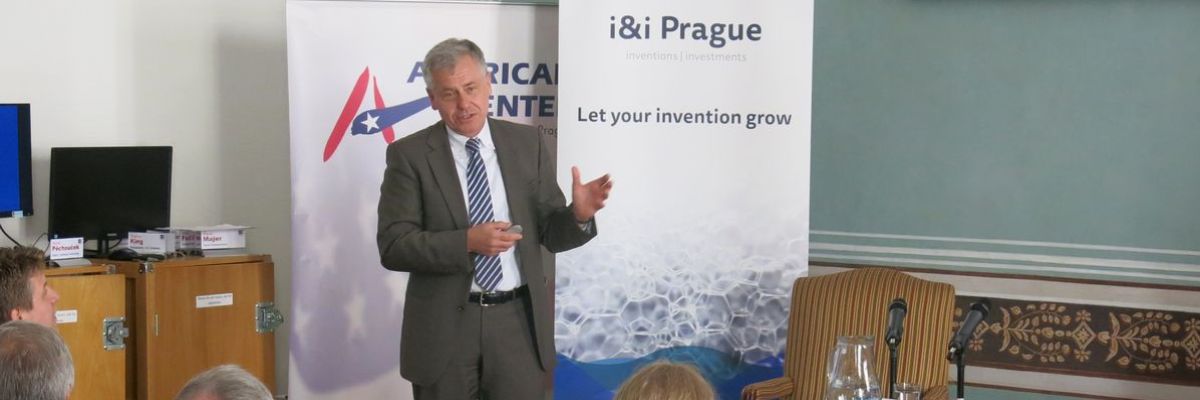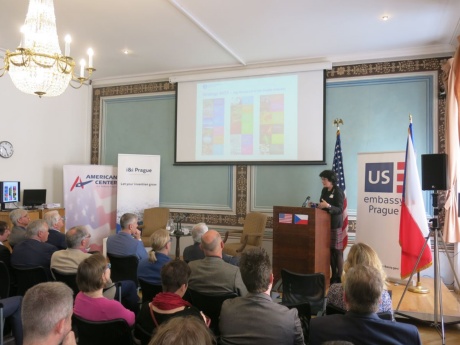
Where science meets business: Czech-U.S. Day of Applied Science was held in Prague
11. 04. 2019
The scientific and business cooperation between the U.S. and the Czech Republic has been steadily growing in the past ten years; it has even birthed several dozens of innovative technologies. Further broadening of these activities, i.e. connecting interested parties in the areas of both basic and applied research, investments, and industry, was the main goal of the conference named “Czech-U.S. Day of Applied Science” with the subtitle “Scientific Research as a Catalyst for Entrepreneurship.” The event, co-sponsored by the U.S. Embassy in Prague and the biotech incubator i&i Prague (a subsidiary of the Institute of Organic Chemistry and Biochemistry of the CAS), was held at the American Center in Prague on April 10.
The well-attended conference’s speakers included the U.S. Ambassador to the Czech Republic Stephen King or the CAS President Eva Zažímalová, who have both stressed the necessity of innovation for business as well as mutual advantages of connections between business and science. Other speakers, namely the CEO of IOCB Tech from the Institute of Organic Chemistry and Biochemistry of the CAS Martin Fusek or the head of the Department of Computer Science at the Faculty of Electrical Engineering of the Czech Technical University Michal Pěchouček, illustrated the potential of business and development opportunities with examples of successful bilateral or interdisciplinary projects.
Science as a catalyst for business
“Despite the fact that the quality of Czech research is significantly growing, utilisation of inventions arising from scientific results is rather underdeveloped. Our incubator helps scientists to exploit a commercial potential of their inventions, e.g. to establish a spin-off company or to find an international company as a licensee,” explained i&i Prague’s CEO Jaromír Zahrádka, adding: “Further engagement of U.S. academic institutions, investors, and companies could have significant fostering effect for the Czech Republic, resulting in development of next success stories such as Dracen Pharmaceuticals spin-off company which is developing a cancer drug based on the invention that has been co-developed by IOCB Prague and Johns Hopkins University.”
“Even if nine out of ten projects supported by our incubator were unprofitable, the tenth project will make enough money to compensate for them, so as a whole, they are financially viable. And scientifically they are significant every time,” commented Martin Fusek from IOCB Tech. Currently, the company evaluates, for example, two promising projects for early detection of cancer. The projects that have already been supported include not only oncology but also epilepsy or microbial resistance.
The president of the CAS speaks about innovations in relation to the Strategy AV21 programmes
Where to plant a tree?
Along with Martin Fusek, the CAS President Eva Zažímalová emphasised the importance of basic research without which the applied one would often be out of the question. “The border between applied and basic research is not sharp, both are interconnected. If you want to have apples, you have to plant a tree. First, however, you need to know where and under what conditions to plant it, and you can harvest the fruits only later. The same is true about research,” she said.
“The most successful ideas are often based on many years of scientific research including long-time experiments, often with participation of scientists from many countries. Such cooperation leads to innovation, and innovation is a way to deal with our problems,” stated the U.S. Ambassador King. “In Wisconsin, I was a manager of a chemical company for many years, so I understand perfectly what obstacles companies have to deal with in their growth and in facing regulatory measures from the government. The countries with the right conditions for entrepreneurs will succeed and will benefit from them,” he concluded.
On the opening photo: Martin Fusek from IOCB Tech
Prepared by: Milan Pohl, Department of Media Communication of the Head Office of the CAS
Photo: Milan Pohl
Read also
- The Czech Republic joins FAIR as an aspirant partner
- Evaluation of the research and professional activities of the Institutes of the CAS for 2010–2014
- The CAS has undergone a demanding evaluation of its research activities
- The Conclusions of the Conference “Overcoming Global Threats”
- New Concept for Digital Data Storage
- Putovní výstava „Umění vědy“ v Jihlavě
- Letní škola astronomie v Brně
- Poprvé na světě: Protony urychlené v plazmatu vytvářeném z vodíkového ledu laserem PALS
- Praha zažije největší setkání sociologů a socioložek v evropské historii
- Finále Expedice vesmír 2015
The Czech Academy of Sciences (the CAS)
The mission of the CAS
The primary mission of the CAS is to conduct research in a broad spectrum of natural, technical and social sciences as well as humanities. This research aims to advance progress of scientific knowledge at the international level, considering, however, the specific needs of the Czech society and the national culture.
President of the CAS
Prof. Eva Zažímalová has started her second term of office in May 2021. She is a respected scientist, and a Professor of Plant Anatomy and Physiology.
She is also a part of GCSA of the EU.

